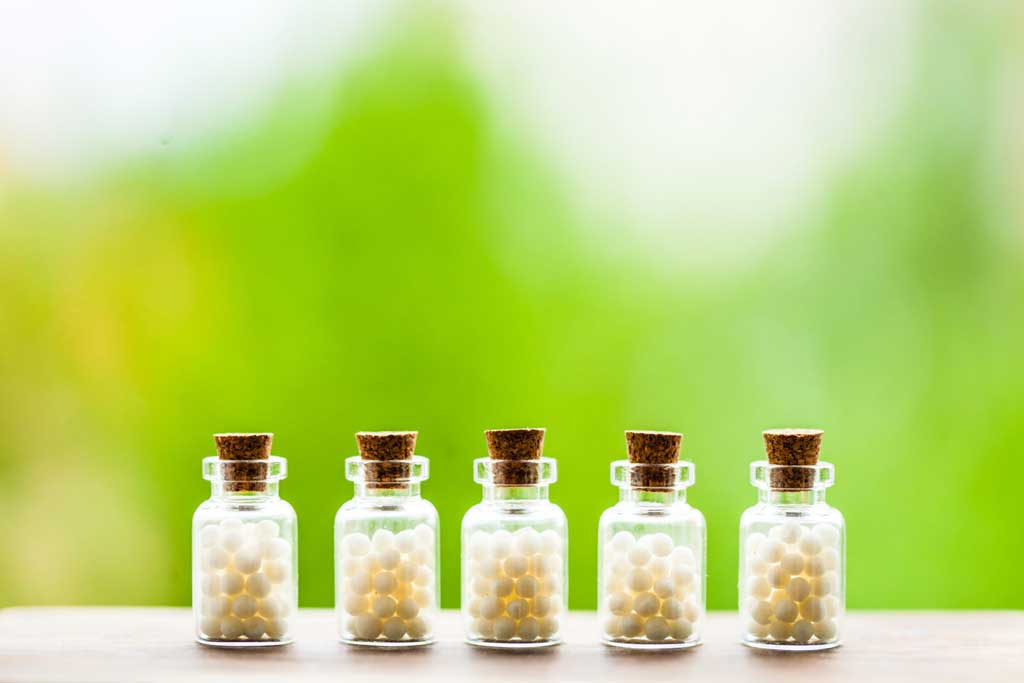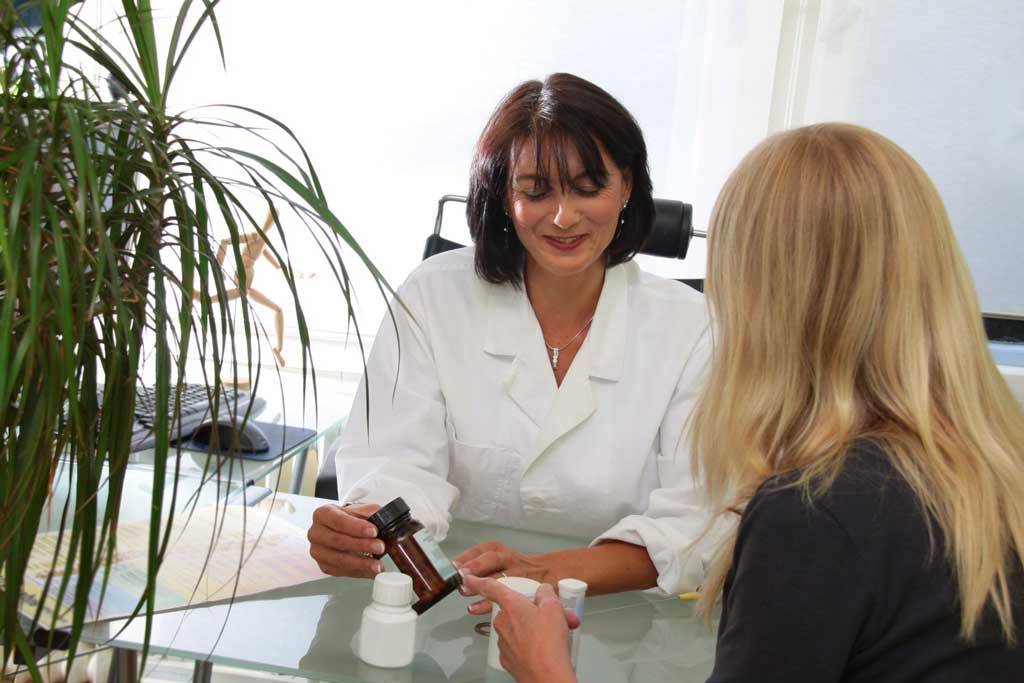Homeopathy explained by a Naturopathic Doctor

While many people consider the terms to be interchangeable, homeopathy and naturopathy are distinctly different approaches to health care and the treatment of illness. Naturopathy uses a variety of approaches, including changes to one’s diet, stress reduction, exercise, counseling and taking supplements. Homeopathy is based on the belief that the body can heal itself. Homeopaths use minute amounts of natural substances targeted at symptoms experienced by an individual to stimulate the healing process.
Some of the confusion about the terms might lie in the fact that naturopathy includes homeopathy as an approach to treatment, while homeopathy is a treatment system of its own. The confusion is exacerbated by the extreme differences in how homeopathy and naturopathy are viewed in the United States versus most of the rest of the world, according to Dr. Reed Sainsbury. Sainsbury, an American Naturopathic Medical Association board-certified doctor in Gadsden, Alabama, owns and operates Life Essentials Natural Healing Clinic. He is a certified Electro Dermal Stress technician and is also trained in the Relaxed Focused Attention emotional release therapy.
In his book, “Healing Poisoned Medicine: Medicine to Heal or Medicine to Kill (Revised 2nd Edition),” Sainsbury explains the difference. “Over 500 million people worldwide and 80 different nations use homeopathic medicine,” he writes. “Homeopathy is highly popular in most European countries, especially France, Germany and England. There are five homeopathic hospitals in the United Kingdom, and the royal families of England, including Queen Elizabeth II, rely upon homeopathic medicine for health care. India has over 200,000 licensed homeopaths, and over 100 million people in India rely solely on homeopathy for their medical care.”
In the United States, however, government oversight creates barriers to credentialing homeopaths, making access to care difficult. Organizations such as the National Center for Homeopathy are dedicated to changing that. The NCH’s mission statement says it … “provides education and builds awareness while advocating for access to homeopathy as a safe, effective and affordable system of medicine.”
So what is homeopathy? According to the American Institute of Homeopathy, there are three principles of homeopathic medicine.
The first is “letting like cure like,” a system of medicine first codified by German physician Dr. Samuel Hahnemann. He theorized that a small dose of something that made a healthy person ill would, conversely, help a sick person heal. According to the AIH website: “In the practice of Homeopathic Medicine, a detailed, comprehensive interview of the patient, called the homeopathic case-taking, is undertaken to reveal the physical, psychological and emotional characteristics and complaints of that individual. The homeopathic practitioner then finds the homeopathic remedy whose materia medica (drug picture) is the most similar to that of the patient’s characteristic totality. That homeopathic prescription (the similimum) is given to the patient to stimulate his/her being to heal: likes cures likes.”
The second principle is to use the minimum dose. Dr. Hahnemann found that using full strengths created many side effects, so he developed a method to increase potency through dilution and succussion, or vigorous shaking. The more diluted the substance becomes, the more potent the treatment is.
The third principle, according to the AIH, is the single remedy. Homeopathic practitioners match one treatment to one ailment so its efficacy can be observed.
The website homeopathycanada.com details success stories based on homeopathic treatments:
- A 2 ½-year-old boy complaining of poor sleep, night terrors and meltdowns was seen by a homeopathic practitioner. The episodes were described as “intense, violent and loud. Vocal repetition, shrieking, capricious and destructive behavior accompanied the tantrums. The child’s expression would alternate between fearful and ‘snarling.’ Mom and Dad reported these events were happening day and night would last for a minimum of 20 minutes. An aversion to water and an unusual tolerance to pain also marked this case.” The practitioner prescribed Stramonium 30CH. “The terror tantrums are gone, sleep is vastly improved and the child is exhibiting new awareness and calm. His parents are now hopeful that his upcoming Autism Spectrum Disorder assessment will simply provide reassurance, rather than a diagnosis.”
- A patient with shingles (herpes zoster) was prescribed “painkillers and patience” by a traditional doctor. The homeopathic practitioner prescribed a dry dose of Mercurius 200c, which relieved the symptoms within three days. The practitioner noted about half his patients presented with skin conditions, citing this as an example of where traditional medicine has failed.
- Another testimonial: “My most recent cured case was one of seasonal allergies. The patient presented with many of the common symptoms of hay fever: runny and itchy eyes, nasal discharge, and sneezing. What was unique about their symptoms was that they were alleviated by being outdoors, and exacerbated by warm, stuffy air. I prescribed Pulsatilla 30Ch in water and they were symptom-free within two days.”
- One practitioner related this example of a patient who had stopped working because of a baffling illness: “Her symptoms included extreme vertigo, where she was listing to the right and could not walk without falling. She also had head pain and her vision was very blurred. She had a few odd symptoms which she told me about; she made many spelling errors (which was never an issue in the past) and her lips and tongue felt sunburned, although she had not been in the sun and had not exposed them to heat recently. I prescribed her 1 pellet of Silica 200C. Three days later, she contacted me to tell me that she felt better than she had felt in her 20s (she’s in her 60s now). All symptoms were gone and she had been into work the day before.”
The NCH provides two approaches to providing access to care. It offers a referral tool to member practitioners, connecting patients to doctors, nurses, pharmacists and others. It also has tools for practicing homeopathy at home. These include a step-by-step guide to observing and recording symptoms and a searchable database of recommended treatments. The database includes links to order products online.
One of the criticisms of homeopathy and other holistic medicines is, “Where’s the science?” The AIH website includes a 214-page, searchable document listing scientific research studies, with links to each. You can find it here. Sainsbury also includes an alphabetized listing of ailments and recommended homeopathic treatments in his book. To order a copy, visit www.healingthecause.com.


Leave a Reply
You must be logged in to post a comment.